101+ Medical Phrases Chinese Learners Should Know in an Emergency
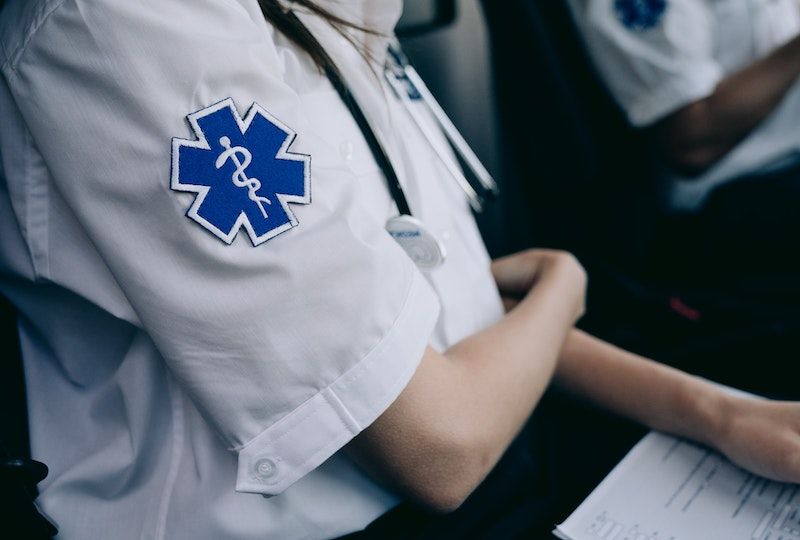
A medical emergency is the last thing anyone wants to experience when traveling. Navigating the health system in one's own country is daunting enough, even without the language challenges that can come into play while you're abroad. The best case scenario is to prepare for an emergency before you leave: hopefully you won't need the information, but you'll be ready just in case. Knowing you have the tools to communicate with a doctor in Mandarin will help you feel more confident as you prepare for your trip.
Before diving into the medical vocabulary in this article, you may want to brush up on the basics of Chinese grammar and pronunciation. Knowing how to ask for directions is also important so you can make your way to a doctor if the need arises. If you can master these fundamentals, you have a better chance of making yourself understood in Mandarin to bystanders and medical professionals during an emergency situation.
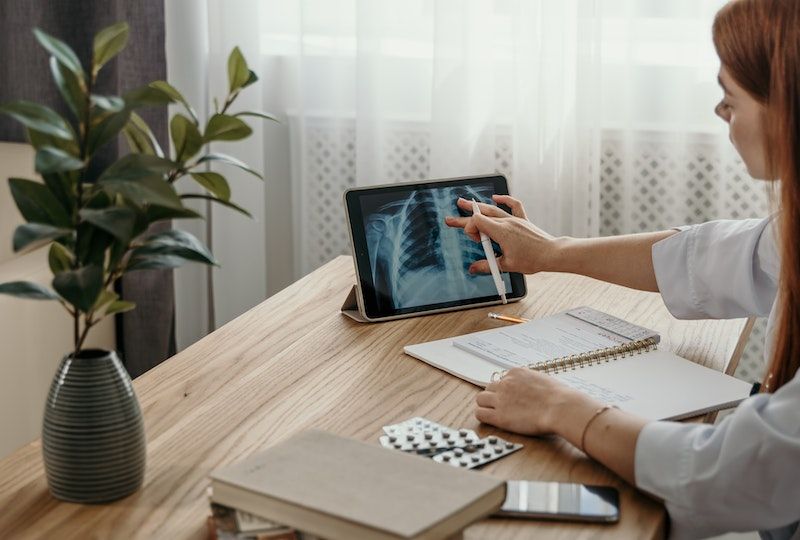
Prepare in Advance in Case of Emergency while Traveling
Any time you travel, it's a good idea to bring your medical information with you, even if you're visiting a country where you speak the language. Having a list of your insurance information, prescriptions, preexisting medical conditions, and allergies on hand will help a visit to the doctor go more smoothly. In cases where you don't speak the local language, make sure to prepare this list in both your native language and the languages spoken in the country or countries you plan to visit. Save your list in a format you'll be able to access while you're abroad, whether that's in an app on your phone or on an old-fashioned sheet of paper you keep with your passport.
It's also a good idea to bring extras of your prescription medications in case your trip gets delayed. If you are flying, make sure you pack your medicine in your carry-on bag, rather than your checked luggage.
Before you leave, check the U.S. Department of State's website for travel advisories related to the country you intend to visit. Their country pages also provide information on additional vaccines you may need, depending on your destination. You can also enroll in the State Department's Smart Traveler Enrollment Program (STEP) which enables the nearest consulate or embassy to send you safety updates and contact you in case of an emergency.

About Chinese Medical Facilities
Unlike the United States, China does not have a very well-developed network of primary care doctors. Although local clinics do exist, most Chinese people prefer to go to a public hospital because they perceive hospitals as having better doctors and more rigorous oversight from the government. Costs at Chinese hospitals tend to be lower than in Western countries, but you must pay for your treatment during your visit, rather than receiving a bill in the mail afterwards. Many doctors speak at least a little English, especially at large hospitals in major cities. However, front desk attendants and other staff may not.
For minor ailments, many Chinese may visit a Traditional Chinese Medicine (TCM) clinic. Patients may be able to see a doctor more quickly at a TCM clinic than at a hospital. However, treatment options vary significantly from Western medicine and include herbal remedies, acupuncture, and hot cups placed on the back and shoulders to rebalance the body's energy, or qi. These treatments can take longer to be effective, and may not be as successful as conventional medicines.
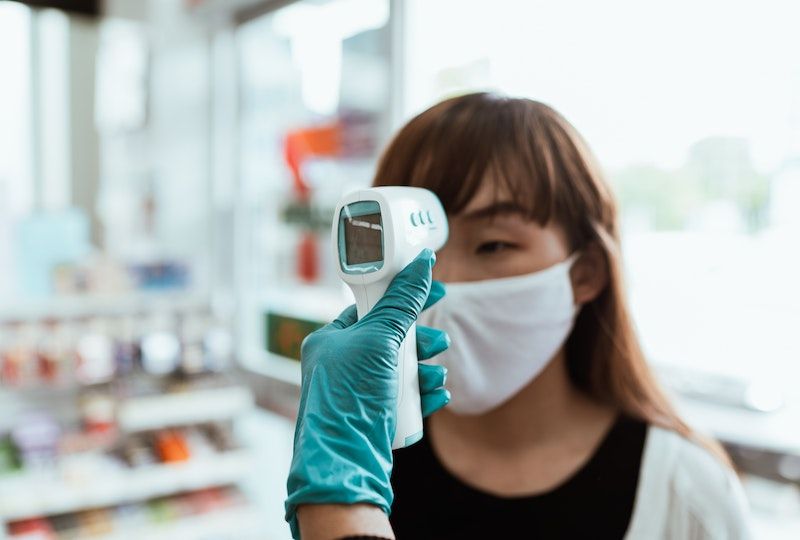
Going to the Hospital in China
Although public hospitals are probably the most reliable place to receive medical care in China, they can also be very crowded. Up until recently, patients had to stand in line, sometimes for hours, in order to get a ticket to see a specific doctor. Now, some hospitals are implementing online appointment scheduling (预约 yùyuē), for example through mini-apps within WeChat. You can still arrive at the hospital without an appointment, but for non-emergency visits you may be instructed to come back at a later time if the hospital is very busy or if you want to see a specific doctor who is in high demand.
On your first visit to a particular hospital, the staff will issue you a hospital card (病历卡 bìnglì kǎ), which you will need in order to see the doctor and must bring with you on future visits. The card stores your medical records, and each doctor you see will swipe it to record your visit.
Next, show your passport at the admission desk and pay a registration fee (收费 shōufèi). Typically, the fee is around 10-100 Yuan (US $1.50-$15.00). Give a brief description of your issue and which department you want to see. The staff will provide a ticket with your number in line (挂号 guà hào). You may want to ask for a health record book (诊断书 zhěnduànshū) for an additional fee. This is a physical booklet where doctors can record and review your visits and diagnoses.
Your ticket will indicate which department you should go to. Review the signage or ask for directions, and proceed to that department to wait for the doctor. Your number will be called (叫号 jiàohào) when it is your turn. Note that not all Chinese hospitals have private exam rooms: the doctor may examine you in an area separated from the waiting area by only a curtain.
Ideally, the doctor will write you a prescription (处方 chǔfāng) without ordering further tests. In that case, you would proceed to the cashier to pay for your examination, and then to the pharmacy (药房 yàofáng) to pick up the medication. Note that patients are required to fill their prescription at the issuing hospital, not at an outside pharmacy.
If your doctor orders more tests such as x-rays or bloodwork, repeat the process above for each step: check in, get a ticket, wait for your number to be called, then do the test. Once your results are ready, staff will call your number and you will pay to receive your test results (报告 bàogào). Take them back to your doctor, who will proceed with the rest of the exam.
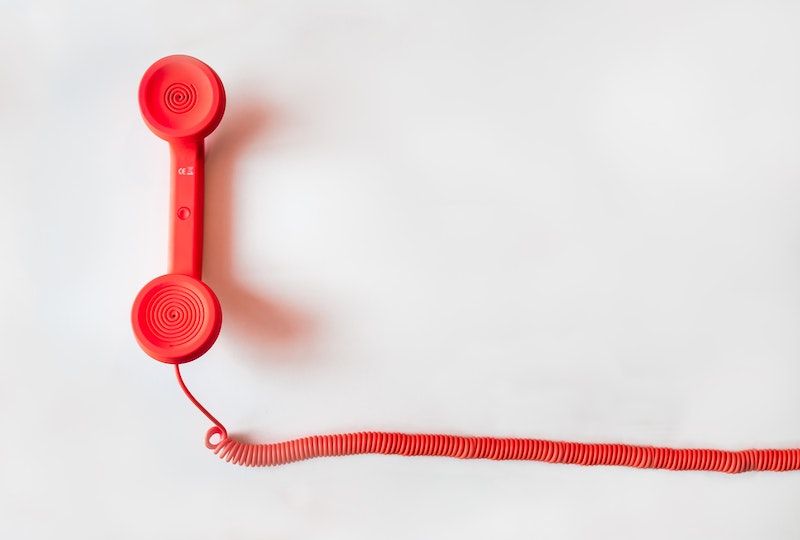
Emergency Contact Numbers in China
You most likely know the emergency contact numbers for your home country by heart. When traveling abroad, it's just as important to know the numbers for local emergency services. You can either memorize the following or write them down in a note app on your phone. It's also a good idea to have a backup hard copy that you keep with your passport, in case your phone gets lost, stolen, or broken.
-
Police – 110: 警察 (Jǐngchá)
Please call the police: 请给警察打电话 (qǐng gěi jǐngchá dǎ diànhuà) -
Ambulance – 120: 救护车 (Jiùhù chē)
Please call an abulance: 请叫救护车 (qǐng jiào jiùhùchē) -
Fire department – 119: 消防队 (xiāofángduì)
Please call the fire department: 请给消防队打电话 (qǐng gěi xiāofángduì dǎ diànhuà)

Chinese Phrases to Use in an Emergency
If you have to call emergency services in China, you should be prepared to speak Chinese to explain your situation. You'll need to provide your name, phone number, and the address of your location. Here are some helpful phrases to use in an emergency:
- Help! 救命啊! (jiùmìng a!)
- Please help me! 请帮帮我! (qǐng bāng bāng wǒ!)
- Emergency situation: 紧急情况 (jĭnjí qíngkuàng)
- My address is…: 我的地址是…(wǒ de dìzhǐ shì…)
- I need to see a doctor: 我需要看医生 (wǒ xūyào kàn yīshēng)
- He was hit by a car: 他被车撞了 (tā bèi chē zhuàngle)
- There’s a fire: 这里有火灾 (zhèlǐ yǒu huǒzāi)

Medical Terms and Phrases in Chinese
Just like English, Chinese has a large number of medical terms and phrases. Luckily, you don't need to memorize them all; the basics should be enough to ensure a visit to the doctor in China goes smoothly. Some of this vocabulary may be useful outside of emergency situations, so it's worth learning. If you're feeling nervous before a doctor's appointment, you could even print out this post, highlight the most applicable phrases, and bring it with you to the hospital.
At the Hospital
It will be helpful to know some basic words for people and places you'll encounter at the hospital. Aside from the ones mentioned above in the section about going to the hospital, here are some more key terms:
- Hospital: 医院 (yīyuàn)
- Doctor: 医生 (yīshēng) / 大夫 (dàifu)
- Nurse: 护士 (hùshi)
- Surgeon: 外科医生 (wàikē yīsheng)
- Emergency room: 急诊室 (jízhěn shì)
Questions the Doctor May Ask You
When your examination begins, the doctor will most likely start by asking what's wrong. It's important to have a basic understanding of these questions so you can answer them accurately.
- Where are you uncomfortable? / Where does it hurt? 你哪里不舒服?(Nǐ nǎli bù shūfu?)
- Do you have a fever? 发不发烧?(fā bù fā shāo?)
- Does your (head) hurt? (头)疼吗?((tóu) téng ma?)
Explaining What Happened
Explaining what happened to cause your medical problem will help the doctor make an accurate diagnosis and prescribe the right treatment. For this part, you may want to brush up on the basics of Chinese sentence structure, including the past tense. This will help you adapt the below phrases to your specific situation.
- I fell down: 我摔倒了 (wǒ shuāi dǎo le)
- I was in a car accident: 我出车祸了 (wǒ chū chēhuò le)
- I hit my (head): 我撞到(头)了 (wǒ zhuàng dào (tóu) le)
- I accidentally cut my (hand): 我不小心割伤了(手) (wǒ bù xiǎoxīn gēshāng le (shǒu))
- Yesterday, I ate (fast food): 昨天我吃(快餐) (zuótiān wǒ chī (kuàicān))
Describing Symptoms
In addition to telling your doctor what happened, you'll need to describe your specific symptoms in as much detail as possible. Below are some common symptoms. Note that for many of these phrases, you can substitute the body part to fit your situation. The next section contains a list of body parts.
- I don’t feel well: 我不舒服 (wǒ bù shūfu)
- My (back) hurts: 我(背)痛 (wǒ (bèi) tòng)
- I have a fever: 我发烧了 (wǒ fāshāo le)
- My nose is running: 我流鼻涕 (wǒ liúbítì)
- I am sneezing: 我打喷嚏 (wǒ dǎ pēntì)
- I am coughing: 我咳嗽 (wǒ késou)
- I am dizzy: 我头晕 (wǒ tóuyūn)
- My (skin) is red: 我的(皮肤)很红 (wǒ de (pífū) hěn hóng)
- My (eyes) are itchy: 我的(眼睛)很痒 (wǒ de yǎnjing hěn yǎng)
- My (leg) is swollen: 我的(腿)肿了 (wǒ de (tuǐ) zhǒng le)
- I have diarrhea: 我拉肚子 (wǒ lādùzi)
- I am constipated: 我便秘 (wǒ biànmì)
- I vomited: 我吐了 (wǒ tǔ le)
- I feel nauseous: 我感觉恶心 (wǒ gǎnjué ěxīn)
- I am short of breath: 我呼吸急促 (wǒ hūxī jícù)
- I have chills: 我发冷 (wǒ fālěng)
- I have a rash: 我有疹子 (wǒ yǒu zhěnzi)
- My (nose) is bleeding: 我流(鼻)血了 (wǒ liú (bí) xiě le)
- I think I’m pregnant: 我想我怀孕了 (wǒ xiǎng wǒ huáiyùn le)
Body Parts and Senses
When describing what part of your body is experiencing discomfort, you don't need to be very technical. The below list of body parts and senses should get you close enough that your doctor knows where to focus the examination.
- Body: 身体 (shēntǐ)
- Head: 头 (tóu)
- Eyes: 眼睛 (yǎnjing)
- Nose: 鼻子 (bízi)
- Mouth: 嘴巴 (zuǐbā)
- Teeth: 牙齿 (yáchǐ)
- Tongue: 舌头 (shétou)
- Ears: 耳朵 (ěrduo)
- Neck: 脖子 (bózi)
- Throat: 嗓子 (sǎngzi)
- Shoulder: 肩膀 (jiānbǎng)
- Arm: 胳膊 (gēbo)
- Wrist: 手腕 (shǒuwàn)
- Hand: 手 (shǒu)
- Finger: 手指 (shǒuzhǐ)
- Chest: 胸部 (xiōngbù)
- Stomach: 胃 (wèi)
- Leg: 腿 (tuǐ)
- Ankle: 脚踝 (jiǎohuái)
- Foot: 脚 (jiǎo)
- Toe: 脚趾 (jiǎo zhǐ)
- Eyesight: 视力 (shìlì)
- Hearing: 听力 (tīnglì)
- Sense of smell: 嗅觉 (xiùjué)
- Sense of taste: 味觉 (wèijué)
Medical Tests
During your exam, your doctor may perform some basic tests to help diagnose the problem. He may also send you to a different part of the hospital for additional testing. Below are some of the most common medical tests:
- Draw blood: 抽血 (chōu xuè)
- Measure blood pressure: 量血压 (liáng xuèyā)
- Listen to your heartbeat: 听诊 (tīng zhěn)
- X-ray: X光 (x guāng)
- Measure body temperature: 量体温 (liáng tǐwēn)
Medical Conditions
Hopefully, your doctor will be able to pinpoint the problem causing your discomfort. Below are some common medical conditions which your doctor may diagnose:
- Sprained (ankle): 脚踝扭伤 (jiǎohuái niǔshāng)
- Broken (leg): 断腿 (duàntuǐ)
- Food poisoning: 食物中毒 (shíwùzhòngdú)
- Allergies: 过敏 (guòmǐn)
- Common cold: 感冒 (gǎnmào)
- Flu: 流感 (liúgǎn)
- COVID-19: 新冠肺炎 (xīnguānfèiyán)
- Dehydration: 脱水 (tuōshuǐ)
- Heatstroke: 中暑 (zhòng shǔ)
- Heart attack: 心脏病 (xīn zàng bìng)
Medications and Medical Equipment
Once your doctor reaches a diagnoses, she will most likely prescribe medicine or equipment to help you recover. Below are some common phrases:
- Medicine: 药品 (yàopǐn)
- Cold medicine: 感冒药 (gǎnmào yào)
- Stomach medicine: 胃药 (wèi yào)
- Headache medicine: 头痛药 (tóu tòng yào)
- Diarrhea medicine: 腹泻药 (fùxiè yào)
- Vitamin: 维他命 / 维生素 (wéitāmìng /wéishēng sù)
- Anti-inflammatory drugs: 消炎药 (xiāoyán yào)
- Antibiotics: 抗生素 (Kàngshēngsù)
- Crutches: 拐杖 (guǎi zhàng)
- Wheelchair: 轮椅 (lúnyǐ)
- Injection: 打针 (dǎ zhēn)
- IV drip: 点滴 (diǎn dī) an
- Sling: 吊带 (diào dài)
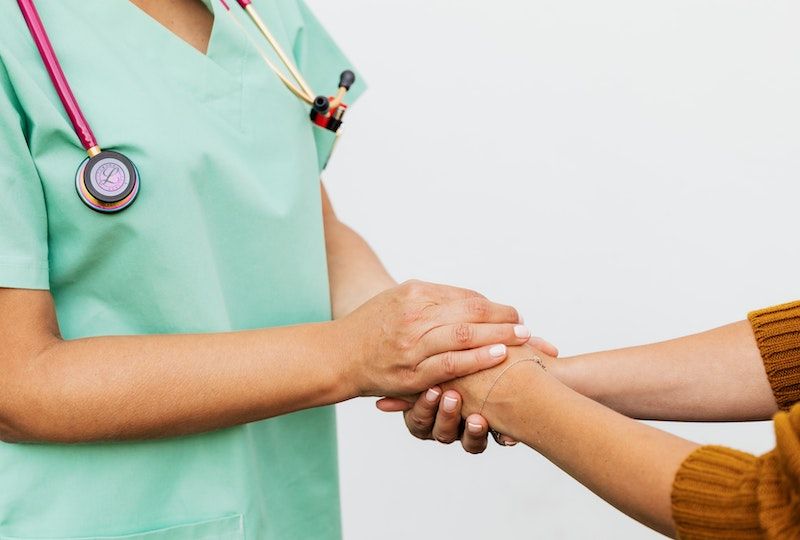
Build Confidence in Your Ability to Navigate Emergencies in Chinese
Nobody likes to think about bad things happening while traveling or living abroad, but it's important to prepare just in case. Your health is important, so when in doubt, make an appointment to see a doctor even if the prospect of navigating a foreign health system feels intimidating. If you master the above words and phrases, you will be able to communicate more effectively with bystanders, doctors, and others in China who can help you in situations from mild physical discomfort to true emergencies. Speechling's language tutors can help you build even more confidence in your ability to navigate emergency situations in Chinese. Even if your medical issue turns out to be nothing serious, discussing it with a doctor may give you peace of mind, not to mention a stronger belief in your own Mandarin-speaking abilities!
